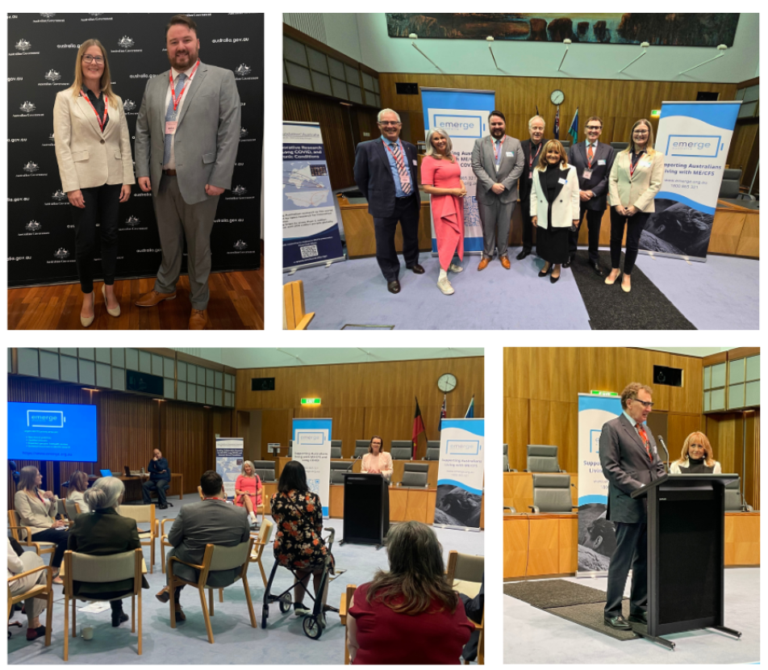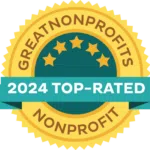On 27 March, at Parliament House in Canberra, Emerge Australia, with the support of Open Medicine Foundation Australia, convened a meeting of clinical, scientific and patient representatives.
The agenda centred on the critical needs of the estimated 250,000 Australians of all ages and from various regions who are living with ME/CFS. Notably, with 75% of those affected being women and 25% confined to their homes or beds, the condition deeply affects over a million Australians, including their families. Despite the significant number of lives touched by ME/CFS, these individuals remain invisible, their voices unheard and their presence unseen in broader societal and healthcare discussions.
The meeting was conducted in the context of Recommendation 8 of Sick and Tired: Casting a Long Shadow Long COVID Inquiry 2023 which said: The Committee recommends funding be made available for Myalgic Encephalomyelitis/Chronic Fatigue Syndrome (ME/CFS) research and patient support and that this funding should be allocated in consultation with peak bodies for ME/CFS and with note of the recommendations of the ME/CFS Advisory Committee’s 2019 report to the National Health and Medical Research Council.
It was highlighted that each year, the failure to effectively address ME/CFS results in a loss of $10-14.5 billion to the Australian economy. In the aftermath of the event, Anne Wilson from Emerge emphasised that viewing health as an investment rather than a cost is crucial. The ME/CFS community in Australia has suffered from exclusion, gaslighting, and the neglect of their needs due to insufficient financial commitment.
More than 260 individuals affected by ME/CFS registered to participate in the meeting via audio, with an additional 40 attendees present in person. The White Paper, scheduled to be completed by 19 April, will include recommendations that, if implemented, promise to significantly improve the lives of people with ME/CFS and Long COVID.
The meeting participants called for a substantial investment in biomedical research to diagnose, manage and treat ME/CFS. It highlighted the importance of establishing new clinical guidelines for ME/CFS to better educate healthcare professionals, and called for the expansion of specialised Telehealth services to meet the needs of patients more effectively.

Speakers included:
- Tracey Spicer AM, Ambassador Emerge Australia and patient with Long COVID lived experience
- Anne Wilson, CEO Emerge Australia
- Bill Ranken, Chair Open Medicine Foundation Australia
- Dr Mike Freelander, Federal Member for Macarthur
- Senator Jordon Steele-John, Co-Chair ME/CFS Parliamentary Friends Committee
- Senator the Hon Anne Ruston, Shadow Minister for Health and Aged Care
- Dr Leanne Laajoki, Director, Department of Health and Aged Care
- Simone Eyssens, patient living with the burden of ME/CFS
- Tori Sommer, carer for husband living with ME/CFS
- Dr Mark Donohoe GP, President ACNEM, Founder / Director, Mosman Integrative Medicine
- Christopher Armstrong PhD, Director, Melbourne ME/CFS Collaboration (OMF Australia)
- Professor Peter Schofield AO, Chair of the Mason Foundation’s National Medical Advisory Panel
- Professor David Putrino, Director of Rehabilitation Innovation at Icahn School of Medicine at Mount Sinai
- Professor Paul Fisher, Chair Emerge Australia’s Medical and Scientific Advisory Committee
- Gabriela Khoury PhD, Burnet Institute
You Can Help!
The National Strategic Framework for Complex Conditions is open for public consultation, and Dr. Leanne Laajoki invited the community to participate in the survey available HERE. Dr. Laajoki emphasised that the primary goals of this update are to enhance support for multi-disciplinary care and to ensure continuity of care through an individual’s lifetime. The government aims to gain a deeper understanding of how disease severity affects individuals and plans to leverage existing health system data to inform improvements.
We strongly encourage you to contribute to making our community a priority in this update by sharing your personal experiences and highlighting what is currently overlooked by the healthcare system. Please also spread the word about this survey to other patients and caregivers, amplifying our collective voice.


